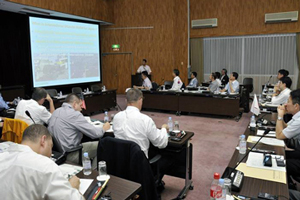Research and Studies Concerning Security
Policy-Oriented Research and Studies
NIDS, as the premier think tank of the Ministry of Defense, carries out research on national security issues in order to provide timely and effective inputs into deliberations at the Ministry of Defense.In FY2011, the NIDS Research Department was reorganized into the Policy Studies Department, Security Studies Department, and Regional Studies Department to enhance its capacity for a broader range of security studies.
NIDS possesses a dual aspect of being not only a government think tank but also an academic research institute.Its characteristics—academic freedom, flexibility of thought unconstrained by existing frameworks, and a long-term perspective looking toward the future—are reflected in its research projects.
NIDS conducts its research projects through the collaboration of researchers with diverse academic backgrounds and Self-Defense Force officers with practical experience.In addition, NIDS promotes intellectual exchanges with government agencies such as the Ministry of Defense, the Self-Defense Forces, and the National Security Secretariat, as well as with academic institutions including domestic and foreign universities and think tanks, the business community such as private companies, and the media such as news organizations.

Current Research Topics
To ensure responses to fluid strategic environments currently surrounding Japan, NIDS is exploring the following themes that are closely related to Japan's national security.
The Strategic Environment in the Indo-Pacific Region
NIDS conducts research and studies on the strategic environment in the Indo-Pacific region, which has a significant impact on Japan’s national security, focusing on the United States, China, the Korean Peninsula, Russia, Southeast Asia, and other key areas.In doing so, NIDS provides its own analysis from a comprehensive perspective, including diplomacy, economy, domestic politics, and military affairs.Furthermore, in addition to the Japan-U.S. Alliance, NIDS studies the nature and framework of multilayered security cooperation to enhance stability in the region.
Global Security Issues
The international community is facing threats such as the proliferation of weapons of mass destruction and ballistic missiles, international terrorism, and piracy.There are also growing concerns about increasing risks to the stable use of the so-called global commons, including the maritime domain, outer space, and cyberspace.NIDS conducts research on responses to these global security issues, as well as on the role of military capabilities in addressing them.
Modern Conflicts and the Role of Military Power
Modern conflicts are becoming increasingly diverse and complex in nature, and the role of military power is also evolving.NIDS analyzes the causes and forms of modern conflicts and conducts research on a wide range of efforts, including conflict prevention, response, and post-conflict reconstruction efforts.
Management and Operation of the Self-Defense Forces
NIDS, as the think tank of the Ministry of Defense, conducts research and studies that directly contribute to the management and operation of the Self-Defense Forces. These include defense strategy, security legislation, defense buildup, crisis management, the roles and structures of the Japan-U.S. Alliance and national defense organizations, as well as defense exchanges and equipment cooperation with foreign countries, in collaboration with internal bureaus and each Self-Defense Force service.
Support for Policy-Making
NIDS undertakes a range of initiatives to provide its research outcomes in a timely and effective manner, supporting policy-making by the Ministry of Defense, the National Security Secretariat, and other relevant government agencies.
In addition to conducting research at the request of policy-related offices of the Ministry of Defense, NIDS provides briefings on security developments in East Asia and Japan’s national security issues to the Minister of Defense, senior ministry officials, relevant officials of the National Security Secretariat and other ministries, as well as members of the Diet.